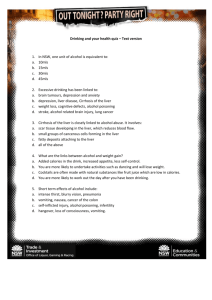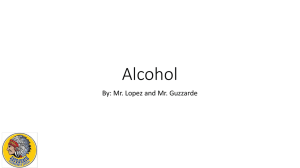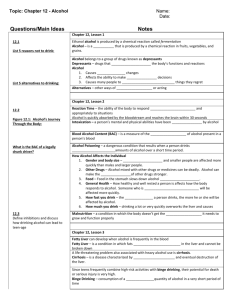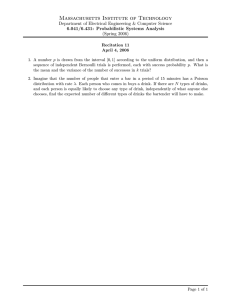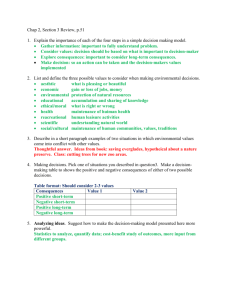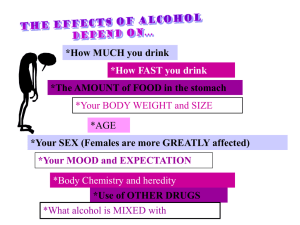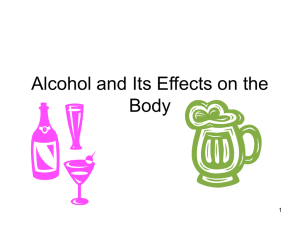Effects of Alcohol on the Body
advertisement
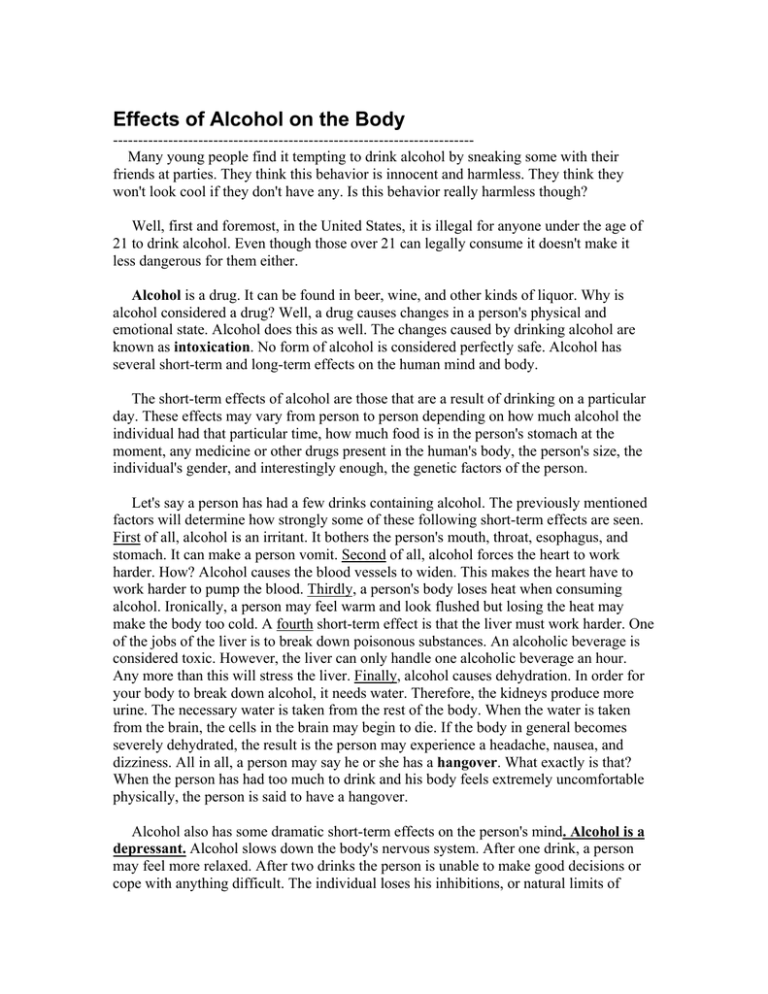
Effects of Alcohol on the Body -----------------------------------------------------------------------Many young people find it tempting to drink alcohol by sneaking some with their friends at parties. They think this behavior is innocent and harmless. They think they won't look cool if they don't have any. Is this behavior really harmless though? Well, first and foremost, in the United States, it is illegal for anyone under the age of 21 to drink alcohol. Even though those over 21 can legally consume it doesn't make it less dangerous for them either. Alcohol is a drug. It can be found in beer, wine, and other kinds of liquor. Why is alcohol considered a drug? Well, a drug causes changes in a person's physical and emotional state. Alcohol does this as well. The changes caused by drinking alcohol are known as intoxication. No form of alcohol is considered perfectly safe. Alcohol has several short-term and long-term effects on the human mind and body. The short-term effects of alcohol are those that are a result of drinking on a particular day. These effects may vary from person to person depending on how much alcohol the individual had that particular time, how much food is in the person's stomach at the moment, any medicine or other drugs present in the human's body, the person's size, the individual's gender, and interestingly enough, the genetic factors of the person. Let's say a person has had a few drinks containing alcohol. The previously mentioned factors will determine how strongly some of these following short-term effects are seen. First of all, alcohol is an irritant. It bothers the person's mouth, throat, esophagus, and stomach. It can make a person vomit. Second of all, alcohol forces the heart to work harder. How? Alcohol causes the blood vessels to widen. This makes the heart have to work harder to pump the blood. Thirdly, a person's body loses heat when consuming alcohol. Ironically, a person may feel warm and look flushed but losing the heat may make the body too cold. A fourth short-term effect is that the liver must work harder. One of the jobs of the liver is to break down poisonous substances. An alcoholic beverage is considered toxic. However, the liver can only handle one alcoholic beverage an hour. Any more than this will stress the liver. Finally, alcohol causes dehydration. In order for your body to break down alcohol, it needs water. Therefore, the kidneys produce more urine. The necessary water is taken from the rest of the body. When the water is taken from the brain, the cells in the brain may begin to die. If the body in general becomes severely dehydrated, the result is the person may experience a headache, nausea, and dizziness. All in all, a person may say he or she has a hangover. What exactly is that? When the person has had too much to drink and his body feels extremely uncomfortable physically, the person is said to have a hangover. Alcohol also has some dramatic short-term effects on the person's mind. Alcohol is a depressant. Alcohol slows down the body's nervous system. After one drink, a person may feel more relaxed. After two drinks the person is unable to make good decisions or cope with anything difficult. The individual loses his inhibitions, or natural limits of behavior. After more than that, a person's eyes can't focus, he or she will slur sounds, lose coordination, and have mood swings. A person may do things that he would never have done without drinking because the alcohol has caused the person to lose judgment. Do you remember how these short-term effects of alcohol are altered by other factors such as weight or how many drinks the person consumed? A test can actually be performed to come up with a blood alcohol concentration ( BAC). This identifies the amount of alcohol in an individual's blood. A blood alcohol concentration of 0.08 is the legal limit for driving but even a lower level of 0.02 causes the person's reaction time to slow and thereby effects the ability to drive safely. A blood alcohol concentration of 0.3 can cause a person to slip into a coma. A blood alcohol concentration of 0.4 can cause death. All of the previously related effects and levels were short-term. There are, as well, serious long-term effects from drinking alcohol on a regular basis. Alcohol can cause high blood pressure, create an irregular heartbeat, and enlarge the heart. It can hurt the liver by causing hepatitis, liver cancer, and cirrhosis. Alcohol use over a lengthy time can cause the stomach lining to bleed. It can also put a major strain on the kidneys. Because alcohol can cause brain cells to die, permanent changes to the brain can result. Some loss of brain activity occurs in all heavy drinkers. Obviously, it is essential that those under the age of 21 never drink alcohol. Adults who choose to drink need to accept responsibility for their decision, drink reasonable amounts, and understand the short-term and long-term effects of alcohol use.
